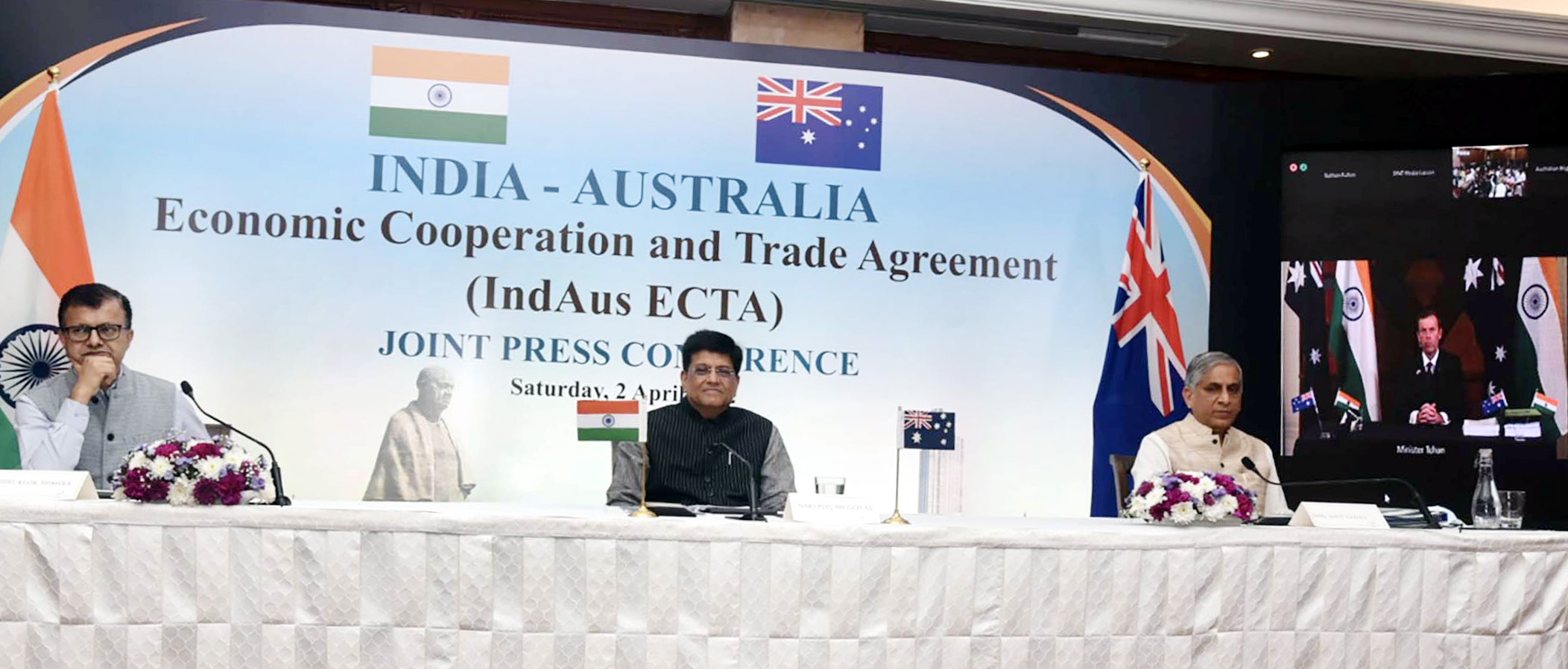Enhancing people to people contact leading to generation of additional businesses, significant increase in exports and employment for more than one million
The Minister of Commerce and Industry, Minster of Consumer Affairs, Food and Public Distribution, and Minister of Textiles, Government of India, Shri Piyush Goyal, and Minister for Trade, Tourism and Investment, Government of Australia, Mr. Dan Tehan, MP, signed the India-Australia Economic Cooperation and Trade Agreement on 2 April 2022, in a Virtual ceremony in presence of the Prime Minister of India, Shri Narendra Modi and Prime Minister of Australia, Mr. Scott Morrison.
The India-Australia ECTA is the first trade agreement of India with a developed country after more than a decade. The Agreement encompasses cooperation across the entire gamut of bilateral economic and commercial relations and covers areas like Trade in Goods, Rules of Origin, Trade in Services, Technical Barriers to Trade (TBT), Sanitary and Phytosanitary (SPS) measures, Dispute Settlement, Movement of Natural Persons, Telecom, Customs Procedures, Pharmaceutical products, and Cooperation in other Areas. Eight subject specific side letters covering various aspects of bilateral economic cooperation were also concluded as part of the Agreement.
ECTA provides for an institutional mechanism to encourage and improve trade between the two countries. The ECTA between India and Australia covers almost all the tariff lines dealt in by India and Australia respectively. India will benefit from preferential market access provided by Australia on 100% of its tariff lines. This includes all the labour-intensive sectors of export interest to India such as Gems and Jewellery, Textiles, leather, footwear, furniture, food, and agricultural products, engineering products, medical devices, and Automobiles. On the other hand, India will be offering preferential access to Australia on over 70% of its tariff lines, including lines of export interest to Australia which are primarily raw materials and intermediaries such as coal, mineral ores and wines etc.

As regards trade in services, Australia has offered wide ranging commitments in around 135 sub sectors and Most Favoured Nation (MFN) in 120 sub sectors which cover key areas of India’s interest like IT, ITES, Business services, Health, Education, and Audio visual. Some of the key offers from Australia in the services space include: Quota for chefs and yoga teachers; Post study work visa of 2-4 years for Indian students on reciprocal basis; mutual recognition of Professional Services and Other licensed/regulated Occupations; and Work & Holiday visa arrangement for young professionals. On the other hand, India has offered market access to Australia in around 103 sub-sectors and Most Favoured Nation in 31 sub-sectors from the 11 broad service sectors such as ‘business services’, ‘communication services’, ‘construction and related engineering services’, and so on. Both sides have also agreed to a separate Annex on Pharmaceutical products under this agreement, which will enable fast track approval for patented, generic and biosimilar medicines.
Australia is the 17th largest trading partner of India and India is Australia’s 9th largest trading partner. India-Australia bilateral trade for both merchandise and services is valued at US$ 27.5 billion in 2021. India’s merchandise exports to Australia grew 135% between 2019 and 2021. India’s exports consist primarily of a broad-based basket largely of finished products and were US$ 6.9 billion in 2021. India’s merchandise imports from Australia were US$ 15.1 billion in 2021, consisting largely of raw materials, minerals and intermediate goods.
India and Australia are partners in the trilateral Supply Chain Resilience Initiative (SCRI) arrangement along with Japan which seeks to enhance the resilience of supply chains in the Indo-Pacific Region. Further, India and Australia are also members of the recently formed Quad, also comprising US, and Japan, to further enhance cooperation and develop partnership across several issues of common concerns.
Sources: PIB, DFAT.Gov.Au
Author Profile
Latest entries
 FEATURED21 July 2024ITU-Huawei Digital Talent Program Launches First Cohort to Drive Global Innovation
FEATURED21 July 2024ITU-Huawei Digital Talent Program Launches First Cohort to Drive Global Innovation FEATURED20 July 2024Huawei and Zambian Government Join Forces to Launch 100 Smart Villages
FEATURED20 July 2024Huawei and Zambian Government Join Forces to Launch 100 Smart VillagesAI18 July 2024Emerging Job Roles in AI
 FEATURED17 July 2024Robotics and Automation Engineering: The Future of Work and Industry
FEATURED17 July 2024Robotics and Automation Engineering: The Future of Work and Industry







